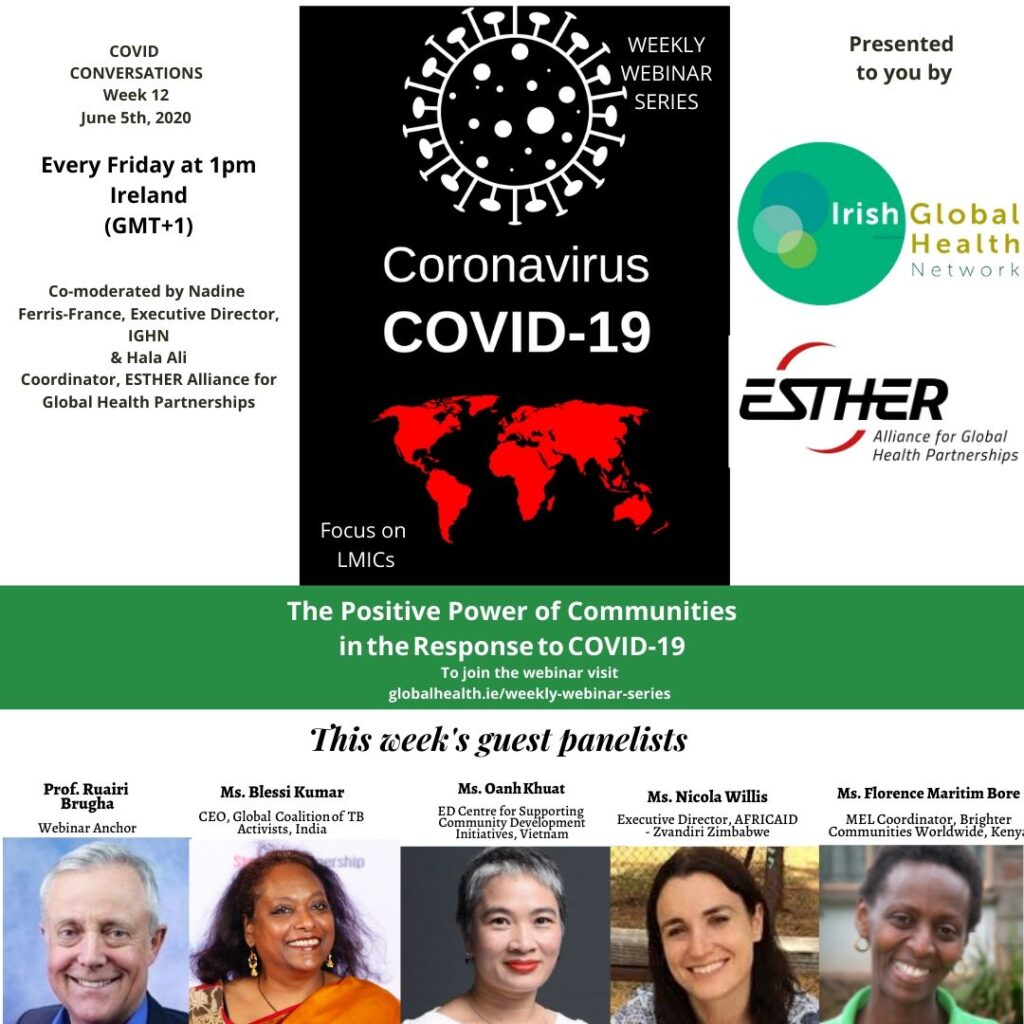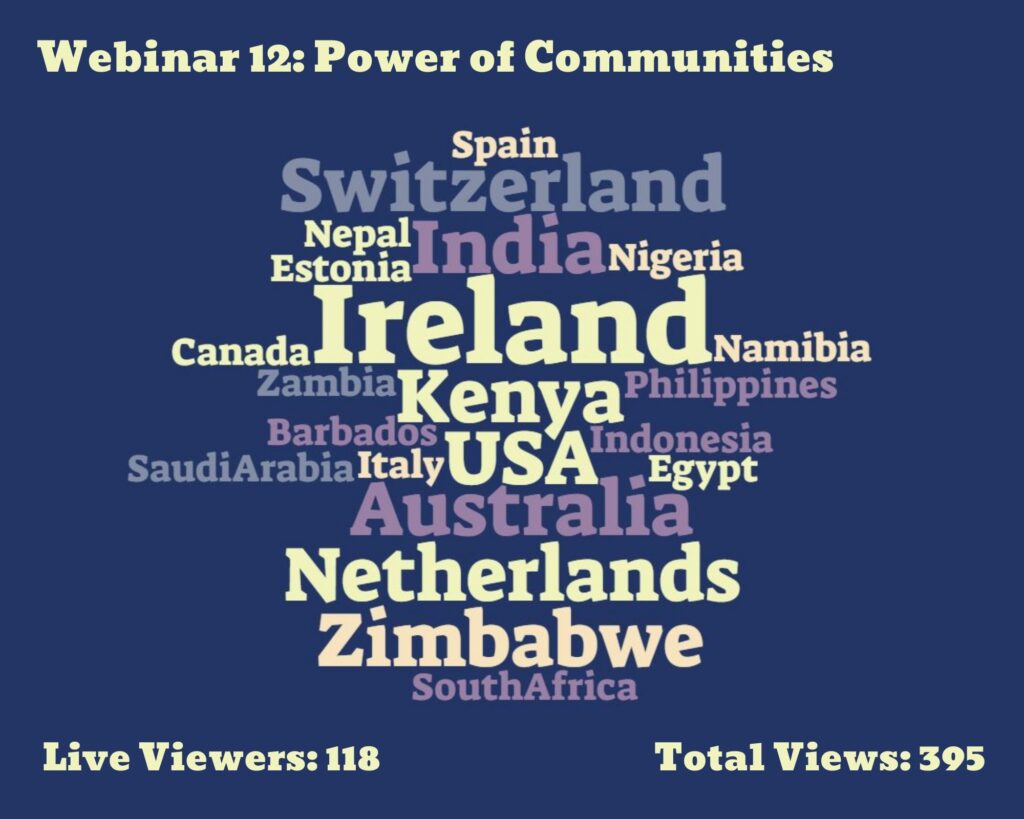Conversations on COVID-19 12th Webinar: The Positive Power of Communities in the Response to COVID-19
 WEBINAR SERIES: WEEK TWELVE The Positive Power of Communities in the Response to COVID-19
WEBINAR SERIES: WEEK TWELVE The Positive Power of Communities in the Response to COVID-19
The twelfth webinar was held on Friday 05/06/2020 at 12:00 pm GMT/1PM Irish Time.
The full suite of resources shared by speakers is available under each of their individual recordings, along with a summary of the points they made. A full list of additional resources shared by participants and hosts during the webinar can be found at the bottom of the page.
VIEW THE WEBINARYour feedback is important to us so that we can continue to share learnings, insights and practices relevant to those working in the LMIC community. Please take the time to complete our evaluation at the button below so that we can continue to improve the series.
COMPLETE WEBINAR EVALUATIONA SUMMARY OF POINTS MADE
Ms Nicola Willis, Executive Director, AFRICAID-Zvandiri, Zimbabwe
To view her contribution, click here
As of this recording, there are 237 confirmed cases of COVID-19 in Zimbabwe, with 4 deaths and a spike observed in the last few days. Testing has increased, and COVID-19 has not yet been seen to affect young people living with HIV. However, young people are facing social isolation, fear around clinic and ARV access. Necessity of travel to clinics may lead to forced disclosure of HIV status, and many are experiencing increased hunger, household stresses and a rise in Gender Based Violence.
Zvandiri work with a cadre of young people living with HIV, called “CATS” – community adolescent treatment supporters, trained as peer counsellors – involved in all sorts of community support programmes. Zvandiri are using virtual case management – online consultation, identifying those who are unwell and screening for mental health disorders. COVID-19 has driven the organisation to develop E-support groups through whatsapp, and for those who do not have phones, there are enhanced community outreach approaches, with healthcare professionals providing in-person home consultations.
Young advocates continue to be the creative drive behind much of Zvandiri’s innovative campaigns to support their peers physical and mental health. One of the most effective have been videos developed to convey quality, relevant content to as many people as possible. Find a sample of Zvandiri’s focused COVID-19 and HIV video series below.
To find out more about AFRICAID- Zvandiri, CLICK HERE
Ms Florence Maritim Bore, Coordinator, Brighter Communities Worldwide, Kenya
To view her contribution, click here
Find Florence’s Slides presentation here
Brighter Communities Worldwide focuses on Health, Education and Economic Empowerment on three levels: Individuals/Families, Communities, and strengthening formal health systems. Kenya had its first case of COVID-19 on March 13th, and the Government acted swiftly; nationwide curfew 7pm – 5am; closed schools; restricted travel etc. To ensure the safety of staff and their families, Brighter Communities Worldwide were trained on COVID-19 before the first case occured, and have an incident management system in place.
This network includes community health volunteers, facilitators, teachers etc., and they have now supported the training of 1,085 people as COVID-19 community workers, providing soap and information on respiratory hygiene, handwashing & social distancing. They have provided 22 town centres and 163 health facilities with handwashing facilities, and continued with their menstrual hygiene programme. COVID-19 has impacted delivery of routine health services in the county, with a 39% reduction in people attending outpatient clinics and a 12% reduction in women visiting health facilities for antenatal care.
Ongoing community outreach has ensured a 66 % increase in handwashing and accurate information has reduced anxiety about COVID-19. However, the prevailing stigma has resulted in low rates of disclosure of COVID-19 symptoms. There also remains a growing struggle to make up for lost incomes while adhering to the Government restrictions. Displacement due to flooding and landslides has made COVID-19 measures a secondary priority to many.
Local administration make up the first line of contact for all arising concerns in the community, along with a county surveillance team. For essential travel, self-isolation measures are implemented, and this community system has aided contact tracing. Until more widespread testing can be rolled out in the area, data on the effectiveness of these measures will be scarce.
- To learn more about Brighter Communities, CLICK HERE
- To learn more about the Mayo General Hospital – Londiani District Hospital partnership, CLICK HERE
- Dr. Méabh Ni Bhuinneáin addressed our 3rd ESTHER Forum speaking on the Mayo General Hospital – Londiani District Hospital partnership. VIEW IT HERE
Oanh Khuat, Executive Director, Centre for Supporting Community Development Initiatives (SCDI), Vietnam
To view her contribution, click here
As of this recording, Vietnam had 7 weeks of no new COVID-19 cases in the community. The very small portion of new cases have been those travelling by plane from other countries, and have all been effectively quarantined. Even though there are low numbers of cases, and lockdown was lifted in April, the country has still seen a loss in employment due to border closures, and therefore food- and housing-insecurity among many vulnerable groups ie. poorest populations, sex workers, drug users and methadone patients. People continue to suffer during and after COVID-19.
SCDI have been working to ensure that community workers (approx. 700 for SCDI) are prepared and consistently working during COVID-19. Many of their employees have lost their primary source of income – SCDI have ensuring that all their employees had the appropriate PPE, and that they retained regular supplemental pay, regardless of ability to continue their usual work with SCDI.
SCDI have done rapid assessments of the secondary effects of COVID-19 restrictions, and have increased their food-distribution efforts, for both homeless people and those living in the slum areas. They have also created donation opportunities of both money and food that the general public have contributed, including the One Egg a Day Project. SCDI are now working not just with their regular communities of focus ie. drug users, sex workers and those living with HIV, but also the homeless urban poor. The organisation has taken COVID-19 as an opportunity to expand their reach to and understanding of vulnerable groups, and have now moved into their second phase of their COVID-19 response, Recovery & Development, which expands on their food- and mask-distribution.
- To learn more about SCDI, CLICK HERE
- To find out more about the One Egg a Day Project, CLICK HERE
- To view Dr. Oanh Khuat’s Key note Address at our annual Father Michael Kelly lecutre 2018, CLICK HERE
- The Diplomat – “The Secret to Vietnam’s COVID-19 Success”
Ms Blessi Kumar, CEO, Global Coalition of TB Activists, India
To view her contribution, click here
In late March, Global Coalition of TB Activists did a rapid global survey into the initial responses to COVID-19; at community, regional & global levels. As various countries began to implement lock-down procedures, one of the main issues raised across the board was public transport restrictions disrupting access to health care facilities and medicine shortages. Reallocation of staff to COVID-19 response has led to major disruptions to regular treatment plans, and later on, nutritional issues and hunger due to loss of earnings & importation of goods began to emerge. All of these factors have contributed to TB and other major illnesses dropping out of focus.
India began lock-down without warning in March, meaning that those who had moved from rural areas to the cities for work had lost their jobs but were unable to return to their hometowns. Many TB patients have died in India due to these issues, along with lack of drug access, prison treatment interruption etc. Global Coalition of TB Activists, India wrote to the health minister, prime minister, and their own central TB division, highlighting these issues and providing community feedback and on-the-ground suggestions for addressing these huge health concerns.
Community volunteers and organisations have been relied upon to follow-up on the response to these requests, and to inform the Coalition of what is actually being practically implemented. So far it has been a rapid and often disorganised effort to respond to this health crisis, but hopefully this will become more formalised as the pandemic progresses. The community is the core of any disease response; early-warning system, ensuring policy implementation etc. They are seldom recognised as such, and so moving forward, investment in community response programmes will be vital.
- “How to Protect ourselves from TB – GCTA Brochure
- The Potential Impact of the COVID-19 Response on TB in High-burden countries: A Modelling Analysis
- Stop TB & GCTA Rapid Assessment
Webinar Anchor: Ruairi Brugha, Professor Emeritus, Former Head of the Department of Public Health & Epidemiology at the Royal College of Surgeons in Ireland
View his COVID-19 stats summary here
Download Ruairi’s Powerpoint Presentation
Ruairi’s Presentation Resources
- COVID-19 Worldometer
- Social Science in Epidemics: Ebola Virus Disease Lessons Learned
- The Lancet: Physical distancing, face masks, and eye protection to prevent person-to-person transmission of SARS-CoV-2 and COVID-19: a systematic review and meta-analysis
Further Resources:
- CNN: How Vietnam managed to keep its coronavirus death toll at zero
- SafetyNet Primary Care Website
- GAA Community: Supporting our members, communities and volunteers during Covid-19
- HIV Ireland: COVID-19 & Sexual Health
- COVID-19: Ireland launches “The Community Call” in major nationwide volunteering effort
- Hungrycities COVID-19 Blog
FULL WEBINAR ARCHIVE

CATEGORIES
- Equity in Action Blog
- Training Programmes
- Sponsorship
- Vaccine Equity
- Get Global – Global Health Talks
- Student Outreach Team
- Get Global Young Professionals Talk Global Health
- Global Health Matters – Live Event Series
- Global Health Matters – IGHN Live Event Series
- An initiative of Irish Global Health Network
- ESTHER Ireland and ESTHER Alliance for Global Health Partnerships
- Global Health Matters – Webinar Series
- ESTHER
- IGHN Conferences
- Global Health Conference 2020
- Women in Global Health – Ireland Chapter
- ESTHER Partnerships
- Weekly Webinar Series
- 4th Global Forum on HRH
- Access to Medicines
- Archive Page Weekly COVID Webinars
- Clean Cooking 2019
- Climate Change and Health Conference 2017
- Conference Abstracts
- Conference Materials
- Covid FAQ
- COVID Funding Opportunities
- COVID-19
- COVID-19: Gender Resources
- Dashboard and online resources
- Education
- ESTHER Alliance
- Events
- Events & News
- Funding covid
- Global Health Exchange 2018
- Global Health Exchange 2019
- Global Health symposium 2019
- Health Workforce/HRH
- Homepage Featured
- Homepage recent posts
- IFGH 2011-2012 Conference and Events
- IFGH 2014 Conference
- IFGH Multimedia
- Irish AIDS Day 2017
- Irish News and Feeds
- Key Correspondent Articles
- Key Correspondent News
- Maternal Health
- Multimedia
- News
- News & Events
- Newsletter
- Opportunity
- Our LMIC's Resources for COVID19
- Partner Country News and Feeds
- Past Events
- Policy
- Presentations
- Recurring events
- Reports & Publications
- Research
- Resources
- Student Outreach Group
- Students Corner
- TEDTalks
- TRAINING COURSES FOR HEALTH CARE PROFESSIONALS
- Uncategorized
- Upcoming Events
RECENT POSTS

Imagine a world without nurses

Making Therapy Accessible: Reimagining Mental Health Through Traditional Healing and Language by Talha AlAli

Decolonisation as a framework for Youth Partnership in Global Health by Arwa Hany Sharaby

“Fight the bullies!”

SOT Pre-Conference Event 2025

